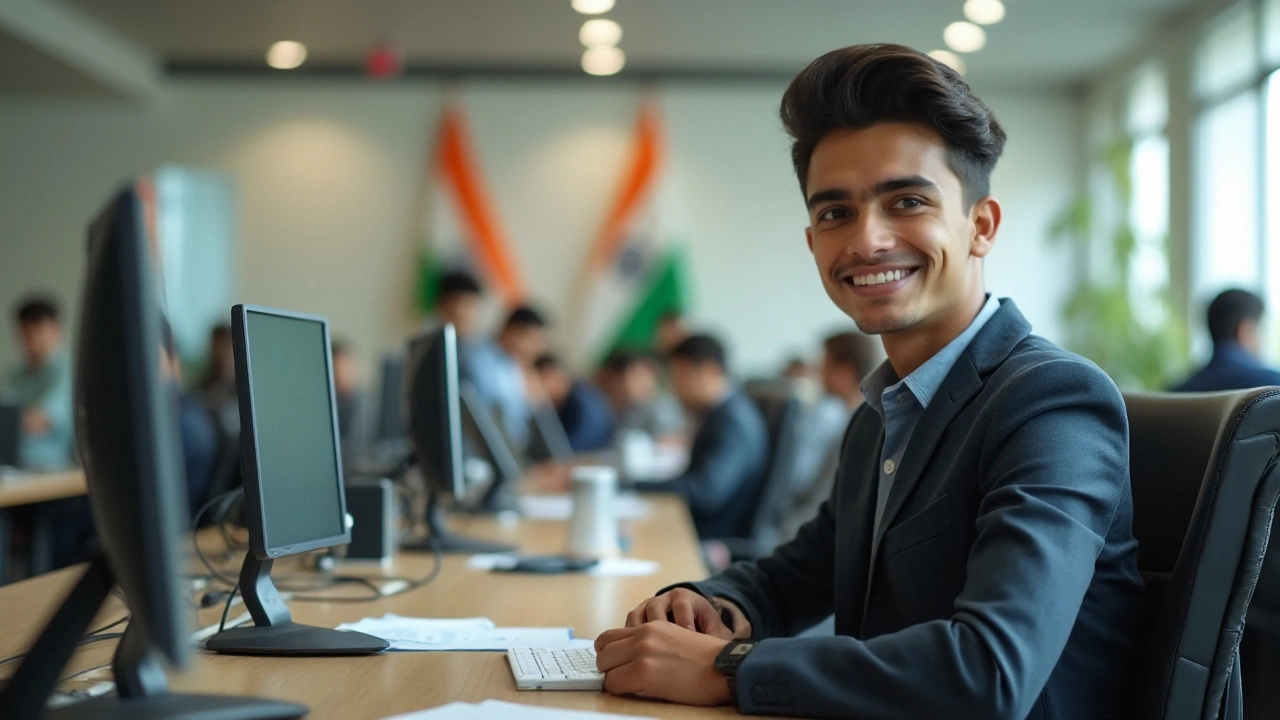
Top Government Jobs Without Experience That Pay Well
Many people dream of securing a government job due to the stability and numerous benefits these roles offer. But did you know there are positions available that do not require any previous experience? It's true! Whether you are just starting out in your career or considering a fresh pathway, understanding these opportunities can be pivotal.
Working in the public sector can be incredibly rewarding, not just financially but in terms of job satisfaction and career growth. From entry-level administrative roles to positions in law enforcement or public service, government jobs provide competitive salaries and benefits. This article explores some of the highest-paying government roles open to individuals without experience. It also provides insights on how to position yourself as a strong candidate.
So if you're ready to explore a new career avenue, read on. We'll break down the best prospects and help you navigate the application process successfully.
- Understanding Government Job Benefits
- High-Paying Entry-Level Positions
- Steps to Qualify for Government Jobs
- Tips for Successful Job Applications
Understanding Government Job Benefits
Government jobs are often sought after for a variety of reasons. One significant attraction is the stability they offer in a world where job security can be elusive. Unlike many private sector positions that are vulnerable to market fluctuations and organizational restructuring, government roles are typically safeguarded against economic downturns. This inherent security provides employees with a sense of trust and assurance regarding their professional future. Moreover, these jobs are usually less prone to layoffs, making them a reliable choice for long-term career planning.
Another noteworthy advantage of government employment is the comprehensive benefits package. These packages frequently include health insurance that covers not only the employee but also their dependents, sometimes at very minimal costs. Additionally, government employees often enjoy robust retirement plans, which can lead to a more secure financial future post-retirement. These benefits far surpass many other industries, making them particularly attractive to those considering entry-level roles without prior experience.
Government jobs also appeal because of the work-life balance they tend to promote. Generally, public sector roles adhere to standard work hour regulations, providing an equitable balance between professional responsibilities and personal life. Employees can take advantage of generous leave policies, including annual leave, sick leave, and sometimes even personal days earmarked for mental health. For those just stepping into their careers, having job-related stress minimized by a supportive work environment can be invaluable.
Career advancement is another aspect where government jobs shine. Many government agencies offer structured career paths and professional development opportunities tailored to foster employee growth. Through continuous training programs and skill-enhancements courses, employees are encouraged to pursue not just horizontal movements, but also vertical promotions within the sector. Even those entering without prior experience can gradually move into more significant positions over time. This career progression increases employee satisfaction and retention.
Moreover, the government encourages diversity and inclusion across its employment landscape. It actively seeks individuals from various backgrounds, ensuring that everyone, regardless of their starting point, is given a fair chance at employment. The emphasis on creating an inclusive work environment is both progressive and inspiring, offering additional appeal to those from underrepresented communities seeking high-paying roles without experience.
Take the words of former American Vice President, Joe Biden, who once emphasized the significance of fair employment:
"We are choosing hope over fear. We're also choosing unity over division and diversity over discrimination."This sentiment reflects the ongoing commitment to equity and opportunity within the public sector.
In some cases, statistics reveal the financial upside of these roles. For example, according to a recent survey, government employees reported a 25% higher overall satisfaction rate with their compensation and benefits compared to their private-sector counterparts. This satisfaction is largely attributed to the holistic nature of the compensation packages, which may include housing stipends and travel allowances alongside the regular salary.
In summary, whether it's the long-term stability, comprehensive benefits, career growth prospects, work-life balance, or the inclusive and progressive work culture, government jobs offer compelling reasons for consideration. Especially for individuals without prior experience, these positions can provide an exceptional starting point for a fruitful career.

High-Paying Entry-Level Positions
When many people think of government jobs, they might imagine positions filled with long-tenured individuals and complicated entry requirements. However, there are a surprising number of opportunities available that offer impressive salaries without demanding extensive experience. Public sector roles can provide a solid foundation for someone fresh out of school or looking to make a career change. With a focus on entry-level jobs where a person can start with little to no prior work experience, there are several avenues to explore that are as lucrative as they are rewarding.
One notable pathway is working as a postal service worker. According to the Bureau of Labor Statistics, postal service clerks, mail carriers, and sorters can earn a comfortable living wage, with the potential for compensation to increase with tenure. These roles often begin with comprehensive training programs, meaning new hires can step into the workforce with confidence and support. Another sought-after role is that of a transportation security officer (TSO), employed at airports to ensure traveler safety. As a Transportation Security Administration (TSA) employee, you'll receive federal benefits, career progression opportunities, and a respectable entry salary that defies the perception of typical starting wages.
Another exciting prospect lies within the civil service sector. Starting roles, such as administrative assistants or support roles in various government agencies, offer a foot in the door with promotional potential. It's not uncommon to start in one of these capacities and ascend to leadership positions with experience. Additionally, working in law enforcement, starting as a police officer offers competitive pay given the level of responsibility. Many police departments provide structured progression pathways, and often they waive experience requirements in favor of adequate training and education—often covered in academy programs.
Other important positions include tax examiners and revenue agents, who primarily work with state and federal governments. They deal with auditing and analyzing tax returns. Many find this path not only deeply educational but also financially rewarding. These roles typically start with modest salaries but have the added benefit of significant growth based on performance.
"The government workforce draws upon the strength and talents of a diverse society, offering equitable opportunities for career development," says a spokesperson from the National Association of Government Employees.Students and recent graduates might also consider entry-level opportunities in research analysis or clerical work within agencies such as the Department of Health and Human Services or the Environmental Protection Agency. Such positions often open doors to advanced roles and a well-paying future in government.
| Position | Average Entry Salary |
|---|---|
| Postal Service Worker | $52,060 per year |
| Transportation Security Officer | $41,490 per year |
| Police Officer | $67,290 per year |
| Tax Examiner | $55,640 per year |
In seeking out these roles, applicants should be skillful in leveraging any internships or academic experiences that align with the job profile. Utilizing resources such as USAJobs.gov can streamline the search process and help find the exact match for your aspirations. As daunting as it may seem, the application process typically involves standardized procedures that are transparent and merit-based. Taking the time to understand the structure of these opportunities can dramatically improve your chances of landing a high-paying role without the prerequisite of formal experience.

Steps to Qualify for Government Jobs
Securing a government job without prior experience might seem daunting at first, but with the right guidance and dedication, it's entirely possible. The pathway to these coveted positions involves a combination of research, strategic application, and self-improvement. The first step is to understand the vast array of roles available across different departments and levels, each offering unique opportunities and salary packages. High pay no experience jobs abound, especially within administrative, clerical, and even entry-level technical posts. Familiarizing yourself with these roles is crucial for identifying the right fit for your skills and career aspirations.
Begin by exploring government job portals and setting up alerts for positions that match your interests. Most government agencies have detailed websites and resources that provide invaluable information about job openings. It's essential to note that while some positions might not require prior experience, others might necessitate specific qualifications or skills, such as proficiency in computer software or a certain educational degree. Keep an eye out for roles that match your existing skills or ones you can quickly acquire through short courses or certification programs.
Once you have identified a potential role, the next step is the application process. Pay close attention to the job advertisement details—requirements, selection criteria, and deadlines are critical and missing any could disqualify you. Crafting a tailored resume and cover letter is vital. Highlight any transferable skills you possess or voluntary experiences that demonstrate your capabilities. Often, government recruiters look for a demonstration of potential, a willingness to learn, and a commitment to public service.
In preparing for the interview stage, understanding the role of the hiring agency is crucial. Research their missions, current initiatives, and any recent news. This knowledge not only impresses interviewers but also helps you gauge your interest and fit within the organization. Preparing for common interview questions is always beneficial, but anticipate questions that probe your motivation for seeking a career in government, your understanding of the position, and your vision for contributing to the public sector. Engage in mock interviews to build confidence and receive feedback.
"The best preparation for tomorrow is doing your best today." — H. Jackson Brown Jr.
The final step involves continuous learning and skill development. Even after securing your job, thriving and advancing in the government sector necessitates a commitment to professional growth. Consider pursuing additional training, workshops, and networking opportunities. The government often provides training programs for its employees which can enhance your skills and career trajectory.
Persistence pays off in the long run when chasing government roles. Learning from each application or interview, refining your approach, and maintaining resilience are crucial. With dedication, you can unlock the door to a rewarding public service career that offers both personal growth and high financial reward without requiring previous experience.

Tips for Successful Job Applications
Submitting an application for government jobs can be a daunting task, especially if you are venturing into the field for the first time. However, with a structured approach, it can be remarkably rewarding. What stands out in the public sector is its transparent, competitive process, which ensures everyone has an equal chance. The key to a successful application lies in understanding what the employer is truly looking for and tailoring your application accordingly. First off, thoroughly researching the role and the department you're applying to can provide you with valuable insights. Knowing the mission, goals, and recent achievements of the agency can help you align your responses with their priorities, showing that you are not just an applicant but a prospective team member who resonates with their cause.
Another crucial step is crafting a powerful resume. When you're targeting high-paying entry-level positions, your resume should highlight any relevant skills and experiences, even those gained outside professional settings. For instance, volunteer work, internships, and extracurricular activities can demonstrate leadership, time management, and other valuable attributes. Government agencies often use automated systems to screen applications, so incorporating relevant keywords derived from the job listing is vital. Remember, your resume is your first impression—make it count by ensuring it's clear, concise, and free of errors.
The process doesn't end with a solid resume. Writing a compelling cover letter is equally important. This is your chance to tell your story—what drew you to a career in public service, and why you're the perfect fit for the position. Use this opportunity to expand on aspects of your resume that are most relevant to the job, and discuss what you hope to contribute to the agency. A personalized cover letter that mirrors the language and values of the organization can significantly enhance your application. In fact, studies have shown that personalizing your letter can increase your chances of getting an interview call by up to 50%.
“Crafting a targeted resume and cover letter for each position is not just helpful—it’s absolutely necessary,” says career expert Alison Doyle. “It shows that you are genuinely interested in the position and willing to put in the work.”
Furthermore, preparing for interviews is an indispensable part of the job application journey. Understanding the format and typical questions can provide a great advantage. Government interviews often focus on competencies and situational questions, meaning they may assess how you have applied certain skills in practical situations. Practicing your answers to common questions, such as 'Describe a time when you had to work as part of a team,' or 'Give an example of a challenge you faced and how you overcame it,' can boost your confidence. It’s also wise to prepare your own questions for the interviewer, showing that you’re eager to learn more about the role and the agency.
Lastly, never underestimate the power of follow-up. After attending an interview, sending a brief thank-you note can leave a lasting impression. It is a gesture that reaffirms your interest and keeps you on the hiring manager’s radar. While waiting for a response, continue to improve yourself. Engage in activities like online courses, workshops, or networking events that add value to your profile. Persistence, patience, and preparation are your best friends when stepping into governmental roles that promise career growth and security.






Write a comment